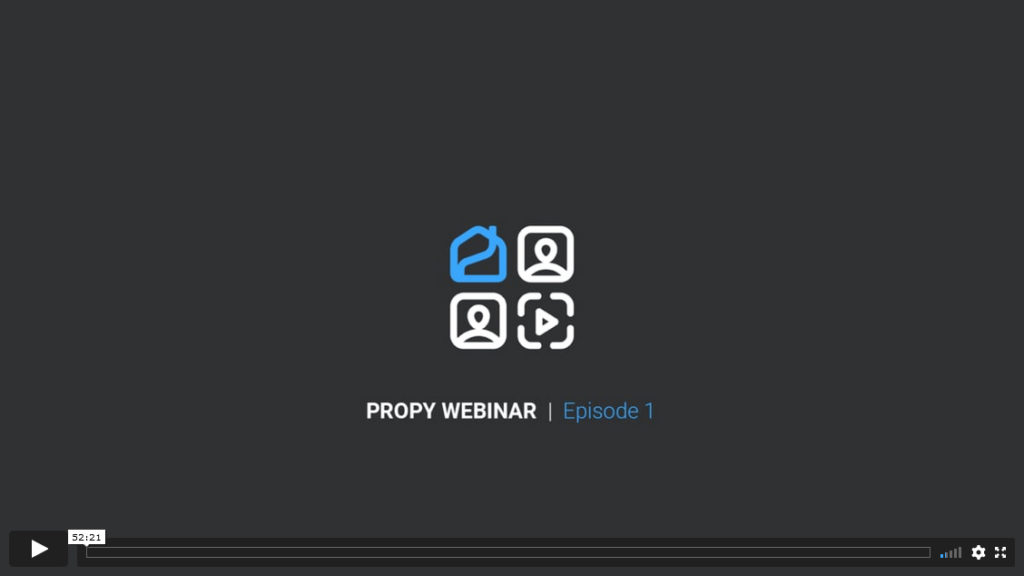Propy’s weekly webinar Episode #1 is with Joshua Harley, CEO at Fathom Real Estate.

Joshua Harley, CEO at Fathom Real Estate joins Propy’s Alex Tieu, COO to discuss how to pivot your business during the pandemic and run your business entirely online. Joshua also explains what real estate agents can learn from the Great Depression-era oil and gas industry.
Quick facts about Fathom Real Estate
- #11 largest independent brokerage
- 4,400 agents
- Virtual brokerage for the past 10 years
Josh states that it’s important to understand that you cannot build a company culture in a vacuum, and that his brokerage goes above and beyond to connect with agents on a personal level. Even though they don’t have a physical office space, prior to the pandemic, they brought agents together on a regular basis. He said it’s important to pay attention to which agents don’t attend a gathering, and reach out to them to let them know they were missed. They will feel important because you noticed they weren’t there.
Extroverts stuck at home
- Most real estate agents are extroverts
- It’s a challenge for extroverts to be at home during the shelter in place
- Make sure you’re connecting with agents often to check in
- You can work virtually, but this is still a business of connecting with people
Lessons from the Great Depression
Josh explains that he has seen a lot of social media posts from agents who are basically sticking their head in the sand. They’re sheltered in place at home, but they’re not focusing on work.
He shares a story about the Great Depression. At that time, there were a lot of oil and gas companies, and when the Depression occurred, most of those companies started to pull back their marketing and advertising budget. There were three companies that continued to invest in their business, and to advertise, and when the Depression ended, those were the only three oil and gas companies that survived. All of the other ones went out of business.
There is opportunity in real estate today if we learn from that example:
- Reach out to your sphere and have conversations
- Many people have cabin fever and will welcome a conversation
- People may say they’re not ready to sell because they’re scared right now
- That doesn’t mean that they’re never going to sell
- Agents who are connecting now will be the ones who are remembered when people are feeling more comfortable with the market
- There may be a little dip in the market, but it will rebound
Managing 4,400 agents virtually
Communication is the key. Josh explains that he is personally reaching out to 15-20 agents per day to see how they’re doing. He is leading by example, so his executive team, and all of their local brokers in charge are also calling agents to check in.
- Touch every single agent as often as possible through this process
- Let them know we care and we love them
- Gauge what is happening in each market
- Encourage agents, and let them know this will pass
- Pick up the phone and call agents; if you only send emails, about 10% of the agents will read them.
- Keep communicating
Growing the brokerage
Communication is important, not just so you can control your systems, but for growth as well. Josh explains that he doesn’t have a team of people recruiting, instead he has 4,400 evangelists who share the story of Fathom with other people.
- 60% of agent growth is from agent referrals
How to use technology to streamline operations
At first, Josh explains, they were using 3rd party technologies, but there were limitations. They were forced to run their workflows and business on how the technology functioned. He said they realized that with those limitations, they wouldn’t be able to grow the way they wanted, so the decision was made to build their own technology platform.
Critical technologies to adopt:
- Personnel management; ability to track commissions, and get agents paid online
- Transaction management
Josh states that the days of handling transactions with paper are over. You must have a transaction management system like Propy that allows you to manage the workflow, transactions, and the ability to view that online. He says that when one of his agents uploads a transaction, he can have a managing broker who is 30 miles away look at that within 15 minutes, review and approve it, or identify missing documents. It can all be done online.
Changes in the way agents and brokers think about real estate since COVID
Josh feels that agents are becoming more comfortable working from home. At first, with the shelter in place, they were forced to be home, but now they’re realizing that they really don’t have to go to the office every day.
- The biggest expense that a brokerage has is the office space
- More people could get paid if brokerages didn’t have big office spaces to maintain
- By removing that overhead, a brokerage also eliminates a lot of risk in their operation
Josh shares some statistics about the average agent at Fathom:
- The average agent who has been with us for 4 years increased their sales by 49%
- Because of the Fathom model, agents are able to keep more of their own money
- On average, agents save $15k by joining Fathom
- They are about to reinvest back into their business
- Many agents double their business in their first year with Fathom
Josh explains that saving $15k is nice, but not life changing for an agent. However, closing an extra 15 homes a year—that is truly life changing.
The mindset of working from home
Josh recommends that agents first change their mindset about needing to go to an outside office to do their job.
- Set up your office space in your home, preferably in a room with a door
- When you sit down in that room, know you are working
- Decorate the space so it feels like a workspace
- Build the discipline to block out the time for your work and stay focused
- Set rules with your family. For example, if the door is shut, this is “Do Not Disturb” time, as you are on appointments and can’t be interrupted
- Don’t let distractions, like unfolded laundry, pull you off-task.
Future of real estate
Josh explains that brokerages need to shed the weight of having offices and invest more into their agents. He cites a NAR study that revealed that only 2% of buyers chose agents based on the brand they were with.
- Brokers need to become agent-centric
- Their job is to serve the agent and lift them up
- Focus on promoting the agent’s brand
“The high tide floats all boats,”
says Josh, and if he can help every agent grow their business by 5-10% that translates into growth in the brokerage.
He also says that brokerages need to utilize more technology and streamline the process for the agents. He explains that because of the technology they use, they have 22 employees to support 4,400 agents. Two employees can onboard 200 agents a month because of their technology.
- Technology is key, but you can’t replace humans
- You can reduce how many people are needed to run the brokerage with good technology
- By removing the overhead expense of offices, and streamlining personnel, a brokerage can be very nimble and profitable even when the market is declining
- Part of running a virtual brokerage is having good, strong local leadership
- You can’t build culture from one office in one state, and build the culture across all the other states
Tips for agents
- Don’t let technology get in the way of being a successful agent; it is meant to supplement and enhance your business
- 90% of the business done by top individual agents is from referrals
- Making connections is critical
- The more you truly love and serve your clients, the more likely they are to refer other people to you, and that’s how you build a successful business.
- Once you have a client in place, you’ve already won that closing
- Your focus from then on should be on how to win that client for life







